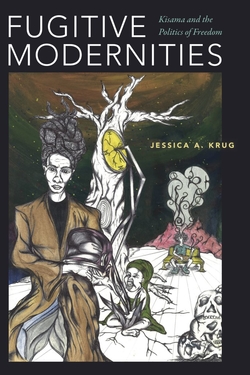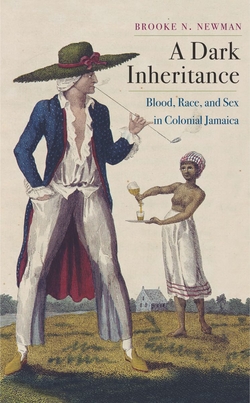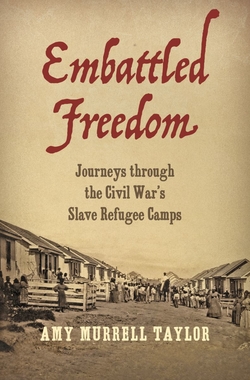Yale announces 2019 Frederick Douglass Book Prize Finalists
New Haven, Conn.— Yale University’s Gilder Lehrman Center for the Study of Slavery, Resistance, and Abolition today has announced the finalists for the 21st annual Frederick Douglass Book Prize, one of the most coveted awards for the study of the African American experience. Jointly sponsored by the Gilder Lehrman Institute of American History and the Gilder Lehrman Center for the Study of Slavery, Resistance, and Abolition at the MacMillan Center at Yale University, this annual prize of $25,000 recognizes the best book on slavery, resistance, and/or abolition published in the preceding year.
The finalists are Jessica A. Krug for “Fugitive Modernities: Kisama and the Politics of Freedom” (Duke University Press); Brooke N. Newman for “A Dark Inheritance: Blood, Race, and Sex in Colonial Jamaica” (Yale University Press); and Amy Murrell Taylor for “Embattled Freedom: Journeys through the Civil War’s Slave Refugee Camps” (University of North Carolina Press).
The winner will be announced following the Douglass Prize Review Committee meeting in the fall, and the award will be presented at a celebration in New York City on February 13, 2020.
A jury of scholars that included Manisha Sinha (Chair) of the University of Connecticut, Manuel Barcia of the University of Leeds, and Vincent Brown of Harvard University selected this year’s finalists from a field of more than 70 nominations.
 The jury’s descriptions of those works follow. Jessica A. Krug’s “Fugitive Modernities: Kisama and the Politics of Freedom” is an outstanding book that reconceives the history of political belonging in the world of Atlantic slavery. Krug tells the story of Kisama, a place on the margins of state politics in sixteenth- and seventeenth-century West Central Africa. Kisama became a point of political, social, and cultural reference—and sometimes even a national identity—in the Americas. With innovative research, style, and sense of purpose, Krug shows how fugitives from state power developed ideas and strategies for surviving the depredations of slavers and empires. Establishing the importance of these efforts in the formation of the Americas, she examines how logics of political belonging have been created and maintained outside the state. Rather than an out-of-Africa origin story, this is an account of the complex processes by which desperate people argued over and decided upon the terms of political legitimacy and self-governance. Krug’s narrative offers a vital new understanding of struggles for freedom within a violent and turbulent world.
The jury’s descriptions of those works follow. Jessica A. Krug’s “Fugitive Modernities: Kisama and the Politics of Freedom” is an outstanding book that reconceives the history of political belonging in the world of Atlantic slavery. Krug tells the story of Kisama, a place on the margins of state politics in sixteenth- and seventeenth-century West Central Africa. Kisama became a point of political, social, and cultural reference—and sometimes even a national identity—in the Americas. With innovative research, style, and sense of purpose, Krug shows how fugitives from state power developed ideas and strategies for surviving the depredations of slavers and empires. Establishing the importance of these efforts in the formation of the Americas, she examines how logics of political belonging have been created and maintained outside the state. Rather than an out-of-Africa origin story, this is an account of the complex processes by which desperate people argued over and decided upon the terms of political legitimacy and self-governance. Krug’s narrative offers a vital new understanding of struggles for freedom within a violent and turbulent world.
 In “A Dark Inheritance: Blood, Race, and Sex in Colonial Jamaica,” Brooke N. Newman offers a groundbreaking study of the ways in which blood lineage, race, and gender were used and abused in Jamaica by authorities and planters. In justifying hereditary slavery, the white elite reasserted their hierarchical social status in fast-changing times. Based on extensive and systematic archival work, the book engages with a number of issues pertaining to the history of the African diaspora in the Americas, and it does so through the lens of cultural history. The result is a remarkable text, where ancestry and blood lineage take a central stage, highlighting the creative ways in which they were used to define and redefine who was a slave and who was not, and by extension who was “white” and who was not. Ultimately, this book challenges much of what we have assumed about British slavery in the Caribbean and the rest of the Americas. Newman’s eye-opening findings are likely to influence the historiography of the Spanish, French, and Dutch Caribbean slave systems, where similar notions of hereditary servitude were a central element for the reproduction of structures of control and domination.
In “A Dark Inheritance: Blood, Race, and Sex in Colonial Jamaica,” Brooke N. Newman offers a groundbreaking study of the ways in which blood lineage, race, and gender were used and abused in Jamaica by authorities and planters. In justifying hereditary slavery, the white elite reasserted their hierarchical social status in fast-changing times. Based on extensive and systematic archival work, the book engages with a number of issues pertaining to the history of the African diaspora in the Americas, and it does so through the lens of cultural history. The result is a remarkable text, where ancestry and blood lineage take a central stage, highlighting the creative ways in which they were used to define and redefine who was a slave and who was not, and by extension who was “white” and who was not. Ultimately, this book challenges much of what we have assumed about British slavery in the Caribbean and the rest of the Americas. Newman’s eye-opening findings are likely to influence the historiography of the Spanish, French, and Dutch Caribbean slave systems, where similar notions of hereditary servitude were a central element for the reproduction of structures of control and domination.
 “Embattled Freedom: Journeys through the Civil War’s Slave Refugee Camps” by Amy Murrell Taylor is an original, nuanced, and extremely significant scholarly intervention in the history of emancipation and the American Civil War. Balancing triumphant and pessimistic narratives of the wartime destruction of slavery, it reveals the stories of individuals that structure the larger history of the thousands of African Americans who made their way to contraband, or as Taylor, adopting the abolitionist terminology, calls them, slave refugee camps. Narrating the incredible journeys of individuals in and out of the camps, she draws attention to their attempts to define freedom and politics of survival—securing work, finding shelter, battling hunger, clothing bodies, and keeping faith. In the process, she uncovers vast, untold stories of the freedpeople, whose exodus undermined slavery, weakened the Confederacy, and helped redefine the meanings of freedom and citizenship. Through exemplary research, theoretically sophisticated analysis, and wonderful prose, she brings individual experiences to light, writing the most vivid portrayal of experience in the camps ever published. Taylor concludes convincingly that former slaves’ acts of endurance inside these camps were a central element in the abolition of slavery. A masterwork of research and narration, Taylor’s meditations on the difficult yet inspirational refugee experience of freedpeople carries a timeless message for our own fraught times.
“Embattled Freedom: Journeys through the Civil War’s Slave Refugee Camps” by Amy Murrell Taylor is an original, nuanced, and extremely significant scholarly intervention in the history of emancipation and the American Civil War. Balancing triumphant and pessimistic narratives of the wartime destruction of slavery, it reveals the stories of individuals that structure the larger history of the thousands of African Americans who made their way to contraband, or as Taylor, adopting the abolitionist terminology, calls them, slave refugee camps. Narrating the incredible journeys of individuals in and out of the camps, she draws attention to their attempts to define freedom and politics of survival—securing work, finding shelter, battling hunger, clothing bodies, and keeping faith. In the process, she uncovers vast, untold stories of the freedpeople, whose exodus undermined slavery, weakened the Confederacy, and helped redefine the meanings of freedom and citizenship. Through exemplary research, theoretically sophisticated analysis, and wonderful prose, she brings individual experiences to light, writing the most vivid portrayal of experience in the camps ever published. Taylor concludes convincingly that former slaves’ acts of endurance inside these camps were a central element in the abolition of slavery. A masterwork of research and narration, Taylor’s meditations on the difficult yet inspirational refugee experience of freedpeople carries a timeless message for our own fraught times.
The Frederick Douglass Book Prize was established by the Gilder Lehrman Institute and Gilder Lehrman Center in 1999 to stimulate scholarship in the field by honoring outstanding accomplishments. Previous winners are Ira Berlin and Philip D. Morgan in 1999; David Eltis, 2000; David Blight, 2001; Robert Harms and John Stauffer, 2002; Seymour Drescher and James F. Brooks, 2003; Jean Fagan Yellin, 2004; Laurent Dubois, 2005; Rebecca J. Scott, 2006; Christopher Leslie Brown, 2007; Stephanie Smallwood, 2008; Annette Gordon-Reed, 2009; Siddharth Kara, Judith Carney, and Richard N. Rosomoff, 2010; Stephanie McCurry, 2011; James H. Sweet, 2012; Sydney Nathans, 2013; Christopher Hager, 2014; Ada Ferrer, 2015; Jeff Forret, 2016; Manisha Sinha, 2017; and Erica Armstrong Dunbar and Tiya Miles, 2018.
The award is named for Frederick Douglass (1818–1895), the one-time slave who escaped bondage to emerge as one of the great American abolitionists, reformers, writers, and orators of the nineteenth century.
The Gilder Lehrman Center for the Study of Slavery, Resistance, and Abolition, which is supported by the Whitney and Betty MacMillan Center for International and Area Studies at Yale University, was launched in November 1998 through a generous donation by philanthropists Richard Gilder and Lewis Lehrman and the Gilder Lehrman Institute of American History. Its mission is to advance the study of all aspects of slavery and its destruction across all borders and time. The Center seeks to foster an improved understanding of the role of slavery, slave resistance, abolition, and their legacies in the founding of the modern world by promoting interaction and exchange between scholars, teachers, and public historians through publications, educational outreach, and other programs and events. For further information on events and programming, and to find out how you can support the continuing work of the GLC, visit https://glc.yale.edu/ or contact the Center by phone at (203) 432-3339 or e-mail gilder.lehrman.center@yale.edu.
Now celebrating its twenty-fifth year, the Gilder Lehrman Institute of American History was founded in 1994 by Richard Gilder and Lewis E. Lehrman, visionaries and lifelong supporters of American history education. The institute is the leading nonprofit organization dedicated to K-12 history education while also serving the general public. With a focus on primary sources, the Gilder Lehrman Institute illuminates the stories, people, and moments that inspire students of all ages and backgrounds to learn and understand more about history. Through a diverse portfolio of education programs, including the acclaimed Hamilton Education Program, the Gilder Lehrman Institute provides opportunities for more than five million students, 40,000 teachers, and 21,000 schools worldwide. The Institute’s programs have been recognized by awards from the White House, the National Endowment for the Humanities, and the Organization of American Historians. For further information, visit gilderlehrman.org or call (646) 366-9666.